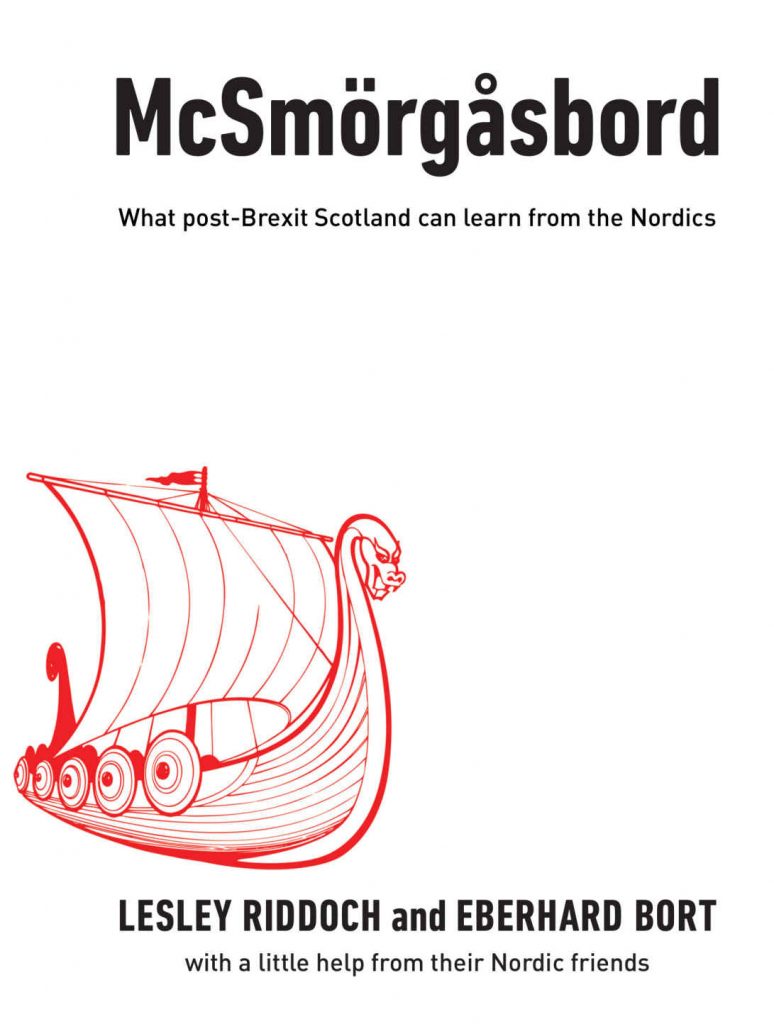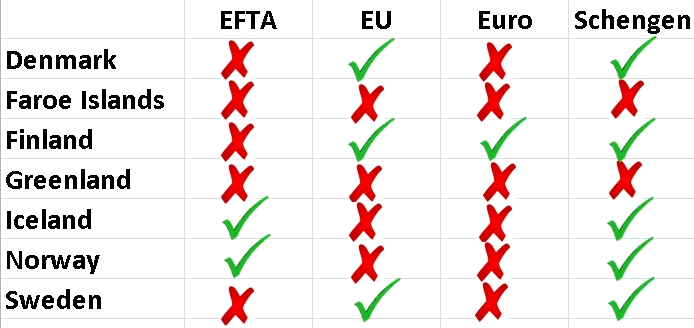 By Lesley Riddoch. Buy the book here. See Harry McGrath’s review in The National.
By Lesley Riddoch. Buy the book here. See Harry McGrath’s review in The National.
In 2016, Nordic Horizons organised an event in which speakers from the Nordic countries explored their “smorgasbord” of relationships with the EU and whether post-Brexit Scotland could learn any lessons from their  experiences.
experiences.
This book is the result.
- Sampling the Smorgasbord of Nordic relations with Europe. Why is the UK intent on a “one singer, one song” approach to Brexit? This diagram shows how the small Nordic nations successfully tailor their European options to suit themselves – in/out of the single market (EEA/EFTA), in/out of the EU, in/out of the euro, in/out of the Schengen border area.
- Norden comprises 5 sovereign nation states and 3 autonomous regions (Faroes, Greenland, Aland), all intertwined in history, but with distinct geography, economic circumstances and visions. They generally identify with a social democratic model – commitment to a welfare state, emphasis on the importance of work, references to innovation, openness, gender equality, cooperation and environmental stability. It is complex and changing – and therefore has different relationships with Europe. Scotland’s circumstances would lead it to a different choice than that chosen by the UK.
- Iceland grew from the poorest country in Europe at the start of the 20th century to the third richest, due to home rule (1944), access to technology and foreign capital, and tariff-free access to foreign markets. This tiny country took on the UK’s gunboat diplomacy in the 3 Cod Wars (1954-76) – and won every time. They entered EFTA in 1970 and the EU single market (EEA) in 1994. They consider the Common Agriculture (CAP), Fisheries (CFP) and European Monetary Union (EMU) as ill-conceived and dysfunctional. Cooperating with their Nordic neighbours, they negotiated free market access for their fish in the EU, without conceding access to their resources.
- Greenland (an autonomous region of Denmark) is 1 of only 2 countries to have left the EU (although Denmark remained in), posing the reverse question “could Scotland stay in the EU while the UK leaves?” This will probably be down to the pragmatism of EU negotiations, to Scotland’s desire to be flexible over the question of sovereignty, and Westminster’s view of its imperial grandeur. Unlikely.
- Faroe Islands (an autonomous region of Denmark, which is responsible for foreign policy, defence and currency) voted Yes to independence in 1946 (but didn’t get it). They make a living from the sea (94% of their exports), so refused to join the EU with Denmark in 1973, gained control of their 200 mile limit in 1977, and have separate fisheries and free trade agreements with the EU.
- Fishing, forestry and agriculture: although in the EEA, Norway is exempt from the CAP and CFP. Norwegian fisheries management is world class, and demonstrably superior to that of the CFP as far as sustainability is concerned. Its goals for its agricultural system are safeguarding food supply at a reasonable price, preserving the landscape and guaranteeing the viability of rural communities.
- Sweden voted narrowly to join the EU in 1994, mainly influenced by the promise of prosperity, higher levels of employment and a boost for the welfare state. Euroscepticism ensured a narrow vote against joining the euro, and in 2016, it closed its Schengen border with Denmark, having taken more refugees per capita than any other European country, but there is little support for a Swexit.
- Finland is totally in and helping to write the EU rulebook. Security and economics featured in its decision due to the breakup of the Soviet Union, as well as its desire for a European identity.
- Options for Scotland: Scotland’s place in Europe is a dead duck, due to Westminster inflexibility. It looks unlikely that powers returned from Brussels will be passed on to Holyrood. Only independence will give Scotland the choice of deciding on the relationship we want with Europe.
Yes Edinburgh West has a website, Facebook, Twitter, National Yes Registry and a Library of topics on Scottish Politics, including Independence.
